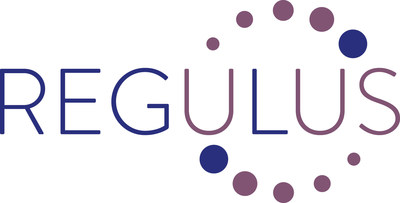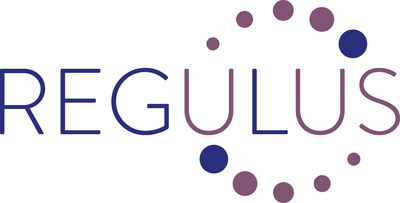Press Releases.
Regulus Reports Positive Top-line Data
LA JOLLA, Calif., June 7, 2016 /PRNewswire/ -- Regulus Therapeutics Inc. (NASDAQ:RGLS), a biopharmaceutical company leading the discovery and development of innovative medicines targeting microRNAs, today announced top-line results from the primary endpoint analysis of one of the company's ongoing Phase II studies of RG-101 for the treatment of Hepatitis C Virus infection (HCV). The study was designed to evaluate a shortened, four-week treatment regimen containing a subcutaneous administration of 2 mg/kg of RG-101 at Day 1 and Day 29, in combination with 4 weeks of once/daily approved anti-viral agents Harvoni®, Olysio®, or Daklinza™. The study enrolled 79 treatment naïve genotype 1 and 4 HCV patients (Harvoni® arm, n=27, Olysio® arm, n=27, Daklinza™ arm, n=25). The primary endpoint of the study is virologic response 12 weeks following conclusion of treatment.

|
Time Since Treatment Completion |
RG-101 + Harvoni |
RG-101 + Olysio |
RG-101 + Daklinza |
|
Week 12 |
27/27 (100%) |
26/27 (96.3%) |
22/24 (91.7%)* |
|
Week 16 |
21/21 (100%) |
19/20 (95.0%) |
20/22 (90.9%) |
|
Week 20 |
14/14 (100%) |
13/15 (86.7%) |
13/13 (100%) |
|
Week 24 |
10/10 (100%) |
8/10 (80.0%) |
8/9 (88.9%) |
*One patient missed the Week 12 visit. Viral load results for this patient at Week 8 and 16 were collected and indicate that the patient was a responder at both time points.
The results from this interim analysis demonstrate significant virologic response through 24 weeks of follow-up. RG-101 plus Harvoni continues to demonstrate 100% response rates. As previously reported, the combination of RG-101 plus either Olysio or Daklinza monotherapies have seen small numbers of viral relapse. The results reported today include four new relapses: two in the Olysio arm (weeks 20 and 32) and two in the Daklinza arm (weeks 12 and 24). RG-101 in combination with four weeks of oral DAA therapy has been generally well tolerated with the majority of adverse events considered mild or moderate, and with no study discontinuations. Commonly reported adverse events (AEs) included fatigue, headache, and injection site reactions.
"These data strengthen our conviction in the clinical utility of RG-101 to shorten oral HCV treatment regimens to four weeks or less. We are very encouraged by the consistent trend in safety and efficacy, which positions RG-101 to play an important role in advancing the current treatment options for HCV patients worldwide," said Paul Grint, M.D., President and CEO of Regulus.
Conference Call & Webcast Information
Today at 8:30 a.m. EST, Regulus will host a conference call and webcast to discuss the topline results. A live webcast of the call will be available online at www.regulusrx.com. To access the call, please dial (877) 257-8599 (domestic) or (970) 315-0459 (international) and refer to conference ID 25993262. To access the telephone replay of the call, dial (855) 859-2056 (domestic) or (404) 537-3406 (international), passcode 25993262. The webcast and telephone replay will be archived on the company's website following the call.
About Hepatitis C Virus Infection (HCV)
Hepatitis C is a result of a hepatocyte specific infection induced by the virus known as HCV. Chronic HCV may lead to significant liver disease, including chronic active hepatitis, cirrhosis, and hepatocellular carcinoma. Up to 185 million people are chronically infected with HCV worldwide, and more than 500,000 people die from HCV annually. The CDC estimates that there are currently approximately 3.5 million persons infected with HCV in the United States. HCV shows significant genetic variation in worldwide populations due to its frequent rates of mutation and rapid evolution. There are six genotypes of HCV, with several subtypes within each genotype, which vary in prevalence across the different regions of the world. The response to treatment varies from individual to individual underscoring the inadequacy of existing therapies and highlights the need for combination therapies that not only target the virus but endogenous host factors as well, such as microRNA-122 (miR-122). Regulus believes that its miR-122 antagonist, RG-101, may be a useful agent in emerging combination regimens to address difficult-to-treat genotypes and to potentially expand upon the current therapies available to clinicians treating HCV patients.
About RG-101 for HCV
RG-101 is Regulus' wholly-owned, GalNAc-conjugated anti-miR targeting miR-122, which the HCV virus uses to replicate. Therapies that interfere with miR-122 could inhibit viral replication, acting earlier in the viral life cycle than currently approved oral agents. In a completed Phase I human proof-of-concept study, Regulus demonstrated that treatment with a single subcutaneous dose of RG-101 as monotherapy resulted in significant and sustained viral load reductions in all treated HCV patients, including patients with difficult to treat genotypes, various liver fibrosis status and those who have experienced viral relapse after a prior IFN-containing regimen.
Earlier this year, Regulus began enrolling patients in an open-label Phase II clinical trial combining RG-101 and GSK2878175 for the treatment of HCV to evaluate the potential to achieve sustained viral responses post treatment with a single subcutaneous administration of 4 mg/kg of RG-101 in combination with daily oral administrations of 20 mg of GSK2878175 for up to 12 weeks in treatment-naïve patients chronically infected with HCV genotypes 1 and 3. Regulus and GSK anticipate reporting interim results from this study by year-end. In an expanded collaboration with GSK, the companies plan to conduct a multi-centered, randomized, dose-ranging Phase II study evaluating the combination of RG-101 and GSK's long-acting parenteral ("LAP") formulation of GSK2878175 as a potential single-visit cure in patients chronically infected with HCV. This study will be conducted outside the United States and is planned to begin in the fourth quarter of 2016. Based on predicted enrollment rates, interim results from this expanded collaboration should be available in the second half of 2017, enabling a potential initiation of a pivotal study in late 2017.
About microRNAs
The discovery of microRNAs in humans during the last decade is one of the most exciting scientific breakthroughs in recent history. microRNAs are small RNA molecules, typically 20 to 25 nucleotides in length, that do not encode proteins but instead regulate gene expression. More than 800 microRNAs have been identified in the human genome, and over two-thirds of all human genes are believed to be regulated by microRNAs. A single microRNA can regulate entire networks of genes. As such, these molecules are considered master regulators of the human genome. microRNA expression, or function, has been shown to be significantly altered or dysregulated in many disease states, including oncology, fibrosis, metabolic diseases, immune-inflammatory diseases and HCV. Targeting microRNAs with anti-miRs, chemically modified, single-stranded oligonucleotides, offers a unique approach to treating disease by modulating entire biological pathways and may become a new and major class of drugs with broad therapeutic application.
About Regulus
Regulus Therapeutics Inc. (NASDAQ:RGLS) is a biopharmaceutical company leading the discovery and development of innovative medicines targeting microRNAs. Regulus has leveraged its oligonucleotide drug discovery and development expertise to develop a well-balanced microRNA therapeutics pipeline complemented by a maturing microMarkersSM biomarkers platform and a rich intellectual property estate to retain its leadership in the microRNA field. Regulus is developing RG-101, a GalNAc-conjugated anti-miR targeting microRNA-122 for the treatment of chronic hepatitis C virus infection, and RG-012, an anti-miR targeting microRNA-21 for the treatment of Alport syndrome, a life-threatening kidney disease driven by genetic mutations with no approved therapy. In addition, RG-125, a GalNAc-conjugated anti-miR targeting microRNA-103/107 for the treatment of NASH in patients with type 2 diabetes/pre-diabetes, has entered Phase I clinical development through its strategic alliance with AstraZeneca. Regulus is also advancing several programs toward clinical development in renal, hepatic and central nervous systems diseases, both independently and with our strategic alliance partners, Sanofi and AstraZeneca. Regulus' commitment to innovation has resulted in multiple peer-reviewed publications in notable scientific journals and has resulted in the formation of strategic alliances with AstraZeneca and Sanofi. Regulus maintains its corporate headquarters in La Jolla, CA. For more information, please visit http://www.regulusrx.com.
Forward-Looking Statements
Statements contained in this press release regarding matters that are not historical facts are "forward-looking statements" within the meaning of the Private Securities Litigation Reform Act of 1995, including statements associated with the expected ability of Regulus to undertake certain activities and accomplish certain goals (including with respect to development and other activities related to RG-101), the projected timeline of clinical development activities, and expectations regarding future therapeutic and commercial potential of Regulus' business plans, technologies and intellectual property related to microRNA therapeutics and biomarkers being discovered and developed by Regulus. Because such statements are subject to risks and uncertainties, actual results may differ materially from those expressed or implied by such forward-looking statements. Words such as "believes," "anticipates," "plans," "expects," "intends," "will," "goal," "potential" and similar expressions are intended to identify forward-looking statements. These forward-looking statements are based upon Regulus' current expectations and involve assumptions that may never materialize or may prove to be incorrect. Actual results and the timing of events could differ materially from those anticipated in such forward-looking statements as a result of various risks and uncertainties, which include, without limitation, risks associated with the process of discovering, developing and commercializing drugs that are safe and effective for use as human therapeutics, and in the endeavor of building a business around such drugs. These and other risks concerning Regulus' financial position and programs are described in additional detail in Regulus filings with the Securities and Exchange Commission. All forward-looking statements contained in this press release speak only as of the date on which they were made. Regulus undertakes no obligation to update such statements to reflect events that occur or circumstances that exist after the date on which they were made.
Logo - http://photos.prnewswire.com/prnh/20160519/370141LOGO
To view the original version on PR Newswire, visit:http://www.prnewswire.com/news-releases/regulus-reports-positive-top-line-data-300280535.html
SOURCE Regulus Therapeutics Inc.
